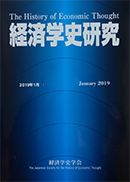Volume 53, Issue 1
Displaying 1-17 of 17 articles from this issue
- |<
- <
- 1
- >
- >|
-
2011Volume 53Issue 1 Pages 1-20
Published: 2011
Released on J-STAGE: August 21, 2019
Download PDF (1759K) -
2011Volume 53Issue 1 Pages 21-43
Published: 2011
Released on J-STAGE: August 21, 2019
Download PDF (1596K) -
2011Volume 53Issue 1 Pages 44-63
Published: 2011
Released on J-STAGE: August 21, 2019
Download PDF (1538K) -
2011Volume 53Issue 1 Pages 64-81
Published: 2011
Released on J-STAGE: August 21, 2019
Download PDF (1511K) -
2011Volume 53Issue 1 Pages 82-99
Published: 2011
Released on J-STAGE: August 21, 2019
Download PDF (1543K) -
2011Volume 53Issue 1 Pages 100-118
Published: 2011
Released on J-STAGE: August 21, 2019
Download PDF (1580K) -
2011Volume 53Issue 1 Pages 119-120
Published: 2011
Released on J-STAGE: October 30, 2019
Download PDF (868K) -
2011Volume 53Issue 1 Pages 121-122
Published: 2011
Released on J-STAGE: October 30, 2019
Download PDF (802K) -
2011Volume 53Issue 1 Pages 123-124
Published: 2011
Released on J-STAGE: October 30, 2019
Download PDF (802K) -
2011Volume 53Issue 1 Pages 125-126
Published: 2011
Released on J-STAGE: October 30, 2019
Download PDF (801K) -
2011Volume 53Issue 1 Pages 127-128
Published: 2011
Released on J-STAGE: October 30, 2019
Download PDF (801K) -
2011Volume 53Issue 1 Pages 129-130
Published: 2011
Released on J-STAGE: October 30, 2019
Download PDF (873K) -
2011Volume 53Issue 1 Pages 131-133
Published: 2011
Released on J-STAGE: October 30, 2019
Download PDF (826K) -
2011Volume 53Issue 1 Pages 134-135
Published: 2011
Released on J-STAGE: October 30, 2019
Download PDF (810K) -
2011Volume 53Issue 1 Pages 136-137
Published: 2011
Released on J-STAGE: October 30, 2019
Download PDF (812K) -
2011Volume 53Issue 1 Pages 138-140
Published: 2011
Released on J-STAGE: October 30, 2019
Download PDF (828K) -
2011Volume 53Issue 1 Pages 141-142
Published: 2011
Released on J-STAGE: October 30, 2019
Download PDF (812K)
- |<
- <
- 1
- >
- >|
